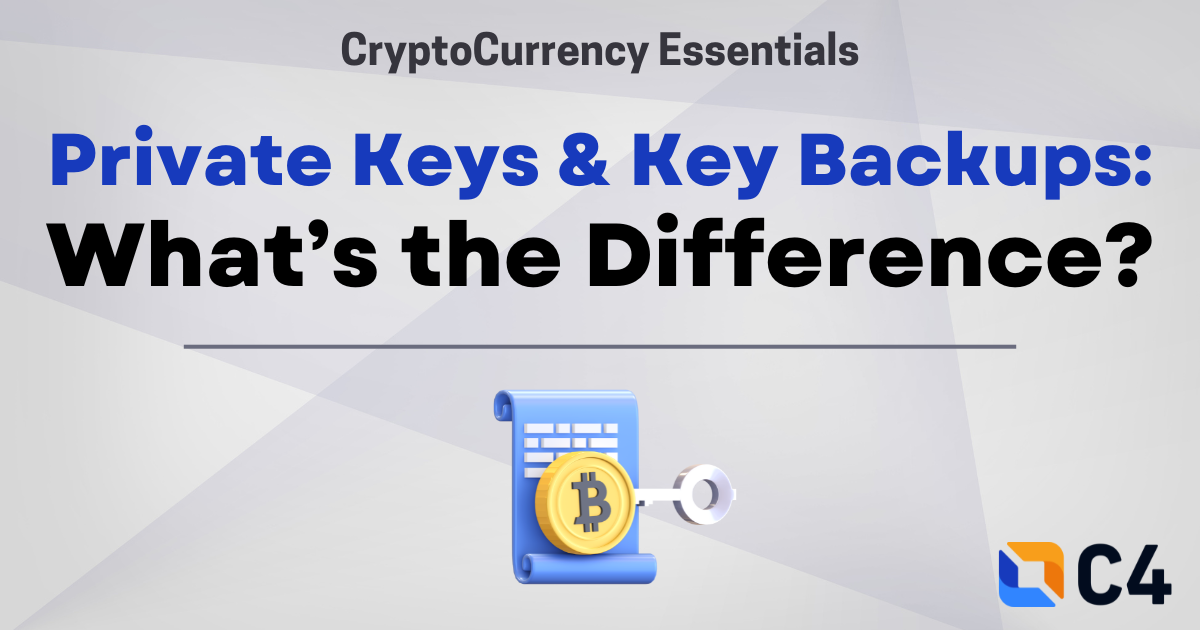
Private Keys and Key Backups: What’s the Difference?
Private key, seed phrase, wallet, blockchain address — crypto can be confusing! If you feel like you’re not sure which one’s which, then this is the article for you. Here, we get into the nitty-gritty of private keys and recovery phrases, their relationship and the differences between them.
Private Keys — Invisible Masters of Crypto
When all is said and done, private keys are the central element of cryptocurrency ownership. Blockchains are digital storage networks, and having the private key for a given address on a blockchain means that you control everything in that given address.
It’s important to note that there are also public keys in addition to private keys, which on the surface might seem confusing, but the difference is simple. Think of your public key as similar to your bank account number. Just like you share your account number with others so they can send you money, you can share your public key with others so they can send you cryptocurrency. However, unlike your bank account number, your public key is a long string of letters and numbers that is specific to the cryptocurrency network you’re using.
On the other hand, your private key is like your banking password. It’s a secret code that only you should know and use to access your cryptocurrency holdings. With your private key, you can access and manage your cryptocurrency, including sending it to others.
So where does the private key come from?
When you want to receive cryptocurrency, you need to create a blockchain address. This address is unique to you and serves as a digital mailbox for receiving cryptocurrency from others. However, in order to access the cryptocurrency that you receive, you also need a private key. This private key is generated when you create your blockchain address and serves as a secret code that only you should know.
It’s incredibly important to keep your private key safe and secure because it gives you control over your cryptocurrency. If someone else were to get hold of your private key, they could access and transfer your cryptocurrency without your permission. This is why it’s crucial to keep your private key secret and secure at all times.
However, private keys can be difficult to manage because they are typically long and complicated strings of alphanumeric characters. To make it easier for you to access your cryptocurrency, many wallets also generate a recovery phrase or backup. This is a series of words that can be used to recover your private key and gain access to your cryptocurrency holdings if your wallet is lost, stolen or damaged. It’s important to keep your recovery phrase safe and secure as well, as anyone who has access to it could potentially access your cryptocurrency holdings.
Recovery phrase (back-up): Your Crypto Fingerprint
The recovery phrase — sometimes called the seed phrase or mnemonic phrase — is a 12, 18, or 24-word pattern generated each time a new wallet is created. Unlike your private key, which relates to just one blockchain address, the recovery phrase is a derivative of your entire wallet, and all private keys stored there.
In layman’s terms, a recover phrase is the “master key” for all of your crypto accounts — it is your private keys in mnemonic form. These words, when entered into another crypto wallet (in the correct order) will recover all of the private keys you were storing on your original wallet. The purpose? Giving you control. Having this phrase means that even if you lose your private keys, you’ll still have access to your blockchain assets.
Let’s take the example of Bitcoin. A Bitcoin public address for example, might look something like this 13mMU4BJWkx6WYqN8gJZozYnRpML71HbgF (Do not attempt to send funds to this address). The public address has a corresponding private key associated with it, which would look like a 256 character version of this: KwdjuN2xEabumdg8eyGQhjFpFYjd4xSqpgnFo8yEKrcFNUPQ4JoM. A private key can be very long and confusing, and it can only access the funds associated with that specific address.
On the other hand, a private seed or mnemonic phrase is much more user-friendly. For example, a 12 word private seed or mnemonic phrase, also known as a BIP-39 phrase, could look like: “siren exit romance abuse bulb suffer ostrich budget verify museum spell accent”. This phrase is more human-readable and can be used to restore funds for multiple addresses and private keys associated with a wallet.
In other words, the private seed or mnemonic phrase can restore all of the private keys associated with a wallet, not just a single one. This is why it’s sometimes considered a master key, as it gives access to all of the crypto assets held in the wallet.
Key Points to Remember:
- A private key and a recovery phrase (backup) are two closely related concepts that are central to securing digital assets on a blockchain.
- Both provide a vector for accessing your blockchain assets, but do so in different ways and have different vulnerabilities.
- Private keys in raw form are 256 characters long, making them impractical for storing, securing and transacting with.
- Your recovery phrase is essential if you lose access to your wallet. Unlike a private key, the seed phrase is a 12, 18, or 24-word pattern generated each time a new wallet is created. Unlike your private key, which relates to just one blockchain address, the recovery phrase is a derivative of your entire wallet, and all private keys stored there.
- Recovery phrases and private keys are two halves of the same whole, but need to be managed differently.
Stay tuned for more additional information in upcoming articles from our CryptoCurrency Essentials Committee!
This article was written by our CryptoCurrency Essentials (CCE) Committee, with special thanks to committee member Manan Vora and Tom Brandl.
Disclaimer
The information presented in this article is for educational and informational purposes only. It does not constitute financial advice, investment recommendations, or any form of endorsement.
The views and opinions expressed by individuals in this article are solely those of the speakers and do not necessarily represent those of C4 or any other organizations with which they are affiliated.
The mention or inclusion of any individuals, companies, or specific cryptocurrency projects in this video should not be considered as an endorsement or promotion.
Regulations and legal frameworks around cryptocurrencies may vary in different jurisdictions. It is your responsibility to comply with the applicable laws and regulations of your country or region.
